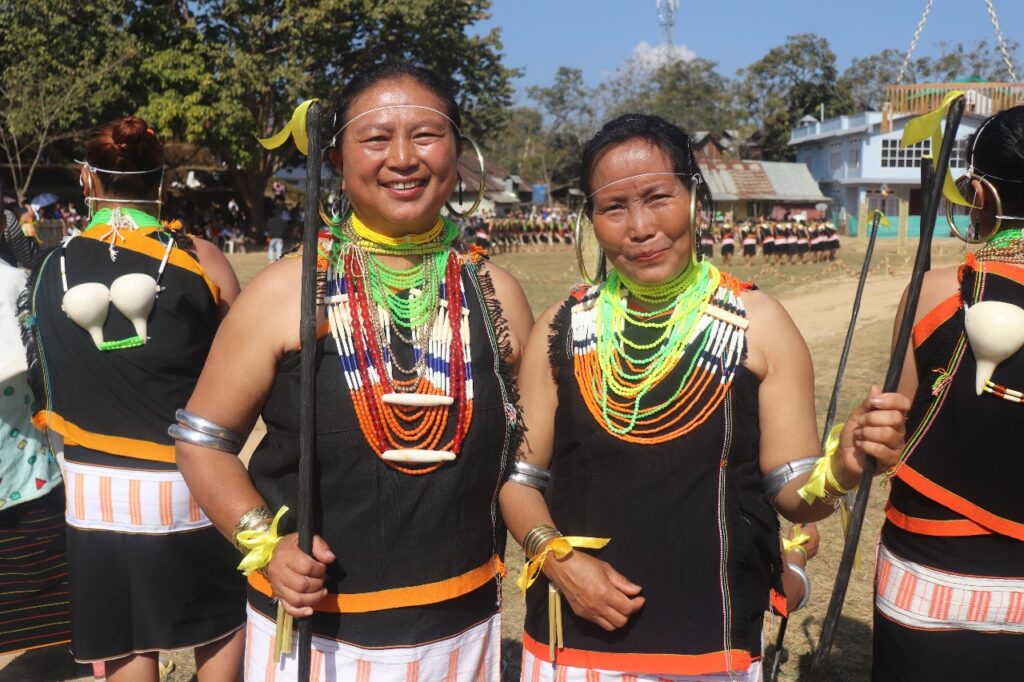EKHON | UKHRUL: Chakhesang community of Jessami village in Ukhrul district began celebrating the three-day Tekru-Nge, a traditional festival of sanctification/purification with much fanfare on Monday. Dressed in traditional attire, the village folks invoked the God’s name to consecrate and cleanse their body, mind and soul to begin the New Year with fresh perspective and outlook.
‘Tekru -Nge’ which means sanctification/purification is an annual celebration similar to the Tangkhul community’s Luira Phanit festival, a seed sowing festival celebrated between February to March. It is one of the most important festivals for the Chakhesang community.
On the inaugural day, proud and striking Chakhesang males from the four ‘khel’ (colony) in full traditional costume took out a procession from their respective community houses and congregated at Jessami Ancient Fort and later gathered at the Church Compound for further celebration. Throughout the procession, both young and old alike recited the ancient chants that reverberated to the call of brotherhood, unity and strength. While females are prohibited to participate in the male centric procession citing bad omen, they went through similar ritual the following day.

Speaking at the occasion as chief guest, Lhiweshelo Mekrisuh, former Speaker, Assembly Affairs, Jessami village stressed that every young boy who had reached the age of eight or nine years must compulsorily baptize or take bath with fresh water from the stream or well, further asserting that, “This ritual must be religiously followed before undertaking the new year’s activities in order that any future misfortune is prevented and make the year a fruitful one.”
Despite many new dynamics coming into play in this modern age, it is important to preserve and promote the culture. Loss of culture is loss of identity, said Lhiweshelo Mekrisuh.
In the olden times, the community celebrated Tekru-Nge for 10 days, each day having their own significance. While the first day is spent preparing for the festivities, the second day holds significance for the male members in the community. The day began by waking up very early in the morning before sunrise and trek towards the fresh spring water source in the jungle, which is yet to be touched by animals and birds. There, they take bath with the fresh spring water and also carried home for those who can’t come to the spot. The washing signified the cleansing of not just their body but mind, spirit and soul to start afresh the year with renewed vigour and strength for ‘a just, peaceful and prosperous life’.
Once home, a spotless unblemished cock is killed and cooked in a brand-new hearth and consumed by the male community. “The unsullied cock (chicken) is prepared in a newly built hearth. The chicken and rice cooked from the same pot and hearth was then served in a fresh banana leaf and consumed by the male members. Similarly, the following day women folks go through the same ritual as male members barring the unblemished hen killed to signify female energy, informed Nizote Mehrisuh, chairman, Jessami Village Council (JVC) to Ekhon.

The significance of killing spotless cock and hen symbolizes purification of sins and bad luck through blood sacrifice in exchange for prosperity, success and new beginning for individuals, he added.
Further sharing the significance of celebrating Tekru-Nge, Nizote Mehrisuh said both men and women who were forbidden or restricted from consuming certain meats (due to illness or other health-related issues) were supposedly ‘liberated from the restriction’ post the observance of the festival.
Towards the evening a community feast is shared among the members at the village council house. The elders among the community chanted a rhythmic chorus paying homage to their forefather’s practice of invoking the Almighty before food just as Christians say grace before eating. This ancient chant is repeated three times from lowest to highest vocal range.
While this chanting can be done during big community feasts like Tekru-Nge, it was specifically meant for harvest season, shared Nirulo Wezah, Speaker, Assembly Affairs, Jessami.
Held under the theme “Roots”, the three-day long Tekru-Nge celebration will see locals enjoying the festivities with traditional games, folksongs, community feasts and competitions like cultural dance, folk songs, tug of war and echo keche, among others.
Situated in the extreme north of Manipur in Ukhrul district and bordering with Meluri, Nagaland, Jessami is a pretty hillock village surrounded by hill ranges on all sides. It offers great scope for tourism in terms of world war (Battle of Jessami), eco-tourism, wildlife, culture among others.
Today, with a total number between 500-600 households, Jessami boast of guest houses and lodges that has facilities to host both domestic as well as foreign tourists. Adding to the list of global interest to Jessami is Mrs Hume’s Pheasant (Nongin) Reserve that is all set to inaugurate on January 23rd, 2024.
